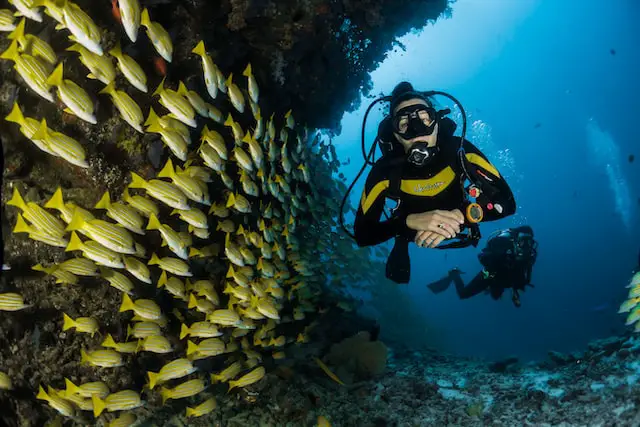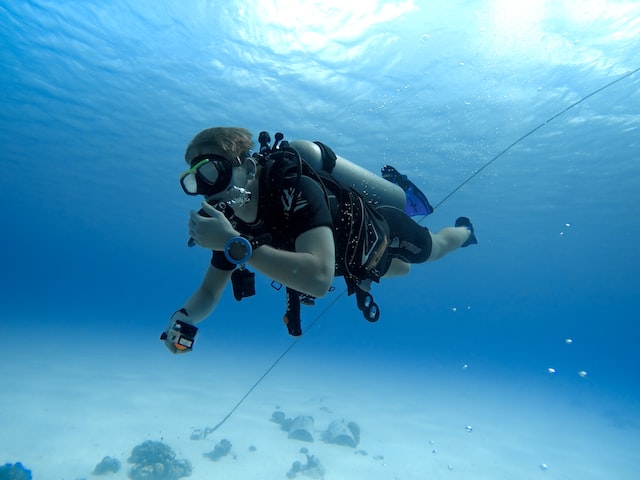Scuba diving involves the use of a tank filled with compressed air to breathe underwater, allowing divers to descend to deeper depths for longer periods of time. Snorkelling, on the other hand, is a surface water activity where the snorkeler uses a snorkel and mask to swim and breathe at the water’s surface.
What is scuba diving?
(Photo by Sebastian Pena Lambarri on Unsplash )

Scuba diving is a form of underwater diving where the diver uses a self-contained underwater breathing apparatus (SCUBA) to breathe underwater. This equipment allows the diver to remain underwater for extended periods of time, typically 30 minutes to an hour. Scuba diving is typically done at depths of 60 feet or more, and requires the use of specialized equipment, including a tank of compressed air, regulator, weight system, and wetsuit.
What is snorkeling?
Snorkeling is a popular water activity that can be enjoyed by people of all ages. It is relatively easy to learn and does not require any special training or equipment, making it a great option for those who want to explore the underwater world without having to commit to scuba diving.
So, what exactly is snorkeling? Essentially, it is swimming on the surface of the water while wearing a mask and breathing through a snorkel. This allows you to see underwater clearly and stay submerged for extended periods of time without having to come up for air, giving you the opportunity to observe marine life up close.
While snorkeling generally isn’t as deep as scuba diving, it can still be an exciting and adrenaline-pumping experience – especially when you encounter large fish or other animals! And, with proper safety precautions in place, it is perfectly safe for people of all ages and swimming abilities.
The differences between scuba diving and snorkeling
The two main types of diving are scuba diving and snorkeling. Both activities allow you to explore the underwater world, but there are some key differences between the two.
Scuba diving is a more intense activity than snorkeling. You need to wear a tank of air on your back, which allows you to stay underwater for extended periods of time. You also need to be able to swim well and have good physical stamina, as scuba diving can be taxing on the body.
Snorkeling, on the other hand, is much less strenuous. You don’t need any special equipment – just a mask, fins and snorkel. This makes it a great activity for people of all ages and fitness levels. Snorkeling is also generally less expensive than scuba diving.
One of the biggest differences between scuba diving and snorkeling is the depth at which you can dive. Scuba divers can go down to depths of 30 metres or more, while snorkelers typically stay in shallower waters (less than 10 meters deep). This means that scuba divers can see a wider range of marine life than snorkelers, who are restricted to shallower waters.
Depth
One of the biggest differences between scuba diving and snorkeling is depth. As mentioned, scuba diving is typically done at much deeper depths, while snorkelling is done in shallow waters. This means that scuba diving offers a more immersive and intimate experience, allowing you to see a wider variety of marine life and explore deeper, more interesting areas. Snorkelling, on the other hand, is more suitable for those who are new to the underwater world and want a more relaxed and surface-level experience.
Equipment
Another major difference between scuba diving and snorkeling is the equipment required. Scuba diving requires a significant amount of specialized equipment, including a tank of compressed air, regulator, weight system, wetsuit, and other accessories. Snorkeling, on the other hand, requires only a mask, fins, and snorkel. This makes snorkeling a more accessible and budget-friendly option for those who are new to the underwater world.
Duration
The duration of a scuba diving and snorkeling trip also differs significantly. Scuba diving typically lasts 30 minutes to an hour, while snorkeling can last anywhere from a few minutes to several hours. This makes scuba diving a more intense and time-sensitive experience, while snorkeling is more relaxed and flexible.
Cost
The cost of scuba diving and snorkeling trips also differs significantly. Scuba diving typically requires the rental or purchase of specialized equipment, which can be expensive. In addition, scuba diving trips often require the use of a dive boat, which adds to the cost. Snorkeling, on the other hand, is a more budget-friendly option, as it only requires the rental or purchase of a mask, fins, and snorkel.
Training
Another significant difference between scuba diving and snorkeling is the amount of training required. Scuba diving requires certification from a recognized scuba diving organization, which typically involves a series of lessons and a certification dive. Snorkeling, on the other hand, does not require any formal training or certification.
Which one should you try?
Of course, both activities have their pros and cons. So, which one should you try? It really depends on what you’re looking for in an underwater adventure. If you’re interested in going deep and seeing as much as possible, then scuba diving is probably the better option for you. However, if you’re just looking to enjoy a leisurely swim with some fish and other marine life, then snorkeling is a great choice.
Which is better scuba diving or snorkeling?
When it comes to enjoying the underwater world, there is no definitive answer as to whether scuba diving or snorkeling is better. It really depends on what you are hoping to get out of your experience.
Both scuba diving and snorkeling offer opportunities to see amazing marine life and coral reefs up close. However, scuba diving allows you to stay underwater for much longer periods of time, giving you a more immersive experience. If you are interested in learning more about the underwater environment and taking part in activities such as fish watching or photographing, then scuba diving is likely the better option for you.
Snorkeling is generally less expensive than scuba diving and requires no formal training, making it a good option if you are simply looking for a relaxing way to enjoy the submarine scenery. Snorkeling also has the advantage of being suitable for people of all ages and swimming abilities.
At the end of the day, both scuba diving and snorkeling can be hugely enjoyable experiences that offer unique insights into the natural world. The best way to decide which is right for you is to try both and see which you prefer!
Can you breathe fully underwater with a snorkel?
Yes, you can breathe fully underwater with a snorkel. However, you will not be able to stay underwater for as long as you could with scuba gear. Snorkels allow you to swim and breathe at the same time, but they do not supply oxygen like scuba tanks do.
Is scuba diving safer than snorkeling?
There are a few key factors that make scuba diving safer than snorkeling. First, when you’re snorkeling you’re floating on the surface of the water which means you’re more vulnerable to waves and currents. Second, you’re relying on your breath-holding abilities to stay underwater which can lead to shallow water blackout if you overexert yourself.
With scuba diving, you have a tank of air that allows you to stay underwater for extended periods of time without having to worry about running out of breath. You also have a regulator that keeps the air flowing even if you’re using up your air supply quickly. And finally, you have a buoyancy control device (BCD) that helps you maintain control while underwater and provides an extra measure of safety if something goes wrong.
Is scuba diving safe for beginners?
While both scuba diving and snorkeling offer a unique way to explore the underwater world, there are some key differences between the two activities. Scuba diving is generally considered to be more dangerous than snorkeling, and as such, beginners are advised to take a scuba diving course before attempting to dive on their own.
Scuba diving involves more complex equipment than snorkeling, and there is a greater risk of injury or death if something goes wrong. Beginner scuba divers should always dive with a qualified instructor who can help them safely navigate the underwater environment.
What are the dangers of scuba diving?
When scuba diving, you are relying on a tank of air to breathe. If the tank runs out of air, or if the air supply is cut off for some reason, you could find yourself in a dangerous situation.
There are also dangers posed by the equipment itself. If your oxygen tank is not working properly, or if your diving suit springs a leak, you could be in serious trouble.
Of course, there are also the usual risks associated with any kind of swimming, such as getting caught in a rip current or being attacked by a dangerous animal. But overall, scuba diving is a safe activity if you take the proper precautions and follow the rules.
What are the dangers of snorkeling?
There are a few dangers associated with snorkeling, the most significant being drowning. Other dangers include getting caught in a rip current and being stung by jellyfish.
Drowning is the biggest danger associated with snorkeling. It can happen easily if you get tired or panicked and don’t have a buddy to help you. Always make sure you know your limitations and stick to them. If you’re not comfortable swimming in deep water, don’t go out too far. And always snorkel with a buddy who can help you if you get into trouble.
Getting caught in a rip current is another danger of snorkeling. Rip currents are strong channels of water that flow away from the shore. They can pull even the strongest swimmers out to sea. If you get caught in a rip current, the best thing to do is swim parallel to the shore until you’re out of the current, then swim back to shore.
Jellyfish stings are also a potential danger when snorkeling. Most jellyfish stings are not serious, but some can be quite painful. If you do get stung, rinse the area with seawater and remove any remaining tentacles with tweezers (if possible). Apply heat to the area (using a hot compress or hot water) to relieve pain and swelling.
Is snorkeling safe for beginners?
Snorkeling is generally safe for beginners, as long as you take some basic precautions. First, always snorkel with a buddy – it’s much safer than going alone. Second, be sure to wear a life jacket or vest if you’re not a strong swimmer. Third, avoid touching reefs or other underwater creatures – they may look harmless, but many can give you a nasty sting. Lastly, always be aware of your surroundings and never swim beyond your abilities. If you follow these simple guidelines, you should have a great time snorkeling!
What happens if snorkel goes underwater?
When you are snorkeling, your face is in the water and you are breathing through a tube. If the tube goes underwater, you will start to breathe water instead of air. This can be dangerous and it is important to surface as soon as possible.
Can you snorkel if you are a weak swimmer?
Yes, you can snorkel if you are a weak swimmer. However, you may want to consider using a life jacket or floatation device to help keep you afloat. You should also avoid snorkeling in areas with strong currents or waves. If you are not comfortable swimming in deep water, you may want to stick to snorkeling in shallower areas.
What are the advantages and disadvantages of snorkeling?
Advantages of snorkeling:
- It is a relatively inexpensive and accessible activity for many people, requiring only basic equipment such as a mask, snorkel, and fins.
- Snorkeling allows for the observation of marine life and coral reefs from the surface, making it a popular activity for nature enthusiasts and families.
- It is a low impact activity that can be enjoyed by people of all ages and swimming abilities.
Disadvantages of snorkeling:
- Snorkeling is limited to shallow waters, preventing exploration of deeper underwater environments.
- It can be more physically demanding than some other water sports due to the constant swimming and breathing required to stay afloat.
- Snorkelers may miss out on some of the more interesting and unique underwater sights and experiences available to scuba divers.
What are the advantages and disadvantages of scuba diving?
Advantages of scuba diving:
- Scuba diving allows you to explore deeper and more diverse underwater environments, including shipwrecks, caves, and deep reefs.
- With a scuba tank, you can stay underwater for longer periods of time, allowing for a more immersive and relaxed diving experience.
- Scuba diving can provide unique opportunities for scientific research, photography, and other specialized activities.
Disadvantages of scuba diving:
- Scuba diving requires specialized training, equipment, and can be more expensive than other water sports.
- The use of heavy scuba gear and diving at deeper depths can be physically demanding, requiring good physical fitness and a certain level of skill.
- Diving at deeper depths also involves risks, such as decompression sickness, equipment malfunctions, and marine life encounters.
- Scuba diving also requires more planning, preparation, and safety procedures than other water sports.
Featured Image By – Photo by Jesse van Vliet on Unsplash








